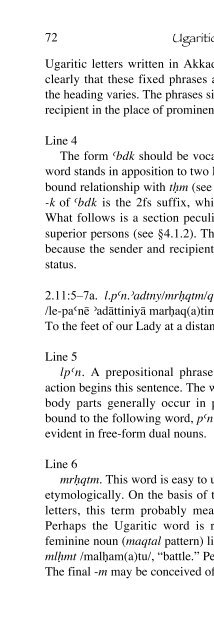A Primer on Ugaritic: Language, Culture, and Literature - enenuru
A Primer on Ugaritic: Language, Culture, and Literature - enenuru
A Primer on Ugaritic: Language, Culture, and Literature - enenuru
Create successful ePaper yourself
Turn your PDF publications into a flip-book with our unique Google optimized e-Paper software.
72<br />
<strong>Ugaritic</strong> <str<strong>on</strong>g>Primer</str<strong>on</strong>g><br />
<strong>Ugaritic</strong> letters written in Akkadian, there is nothing to indicate<br />
clearly that these fixed phrases are modified when their place in<br />
the heading varies. The phrases simply swap places, which puts the<br />
recipient in the place of prominence; thus the thm is nominative.<br />
Line 4<br />
The form {bdk should be vocalized as a dual oblique since the<br />
word st<strong>and</strong>s in appositi<strong>on</strong> to two PNs that are the final element in a<br />
bound relati<strong>on</strong>ship with thm (see Figure 3.3 or §7.3.2.1). The final<br />
-k of {bdk is the 2fs suffix, which refers back to the addressee.<br />
What follows is a secti<strong>on</strong> peculiar to messages from inferiors to<br />
superior pers<strong>on</strong>s (see §4.1.2). This part is lacking from KTU 2.10<br />
because the sender <strong>and</strong> recipient were probably of roughly equal<br />
status.<br />
2.11:5–7a. l.p{n.}adtny/mrhqtm/qlny.<br />
/le-pa{neœ }adaœttiniyaœ marhaq(a)tima qa®lniyaœ./<br />
To the feet of our Lady at a distance we both fall!<br />
Line 5<br />
lp{n. Aprepositi<strong>on</strong>al phrase indicating the directi<strong>on</strong> of the<br />
acti<strong>on</strong> begins this sentence. The word p{n is a dual oblique because<br />
body parts generally occur in pairs. Furthermore, since p{n is<br />
bound to the following word, p{n lacks the final m that is regularly<br />
evident in free-form dual nouns.<br />
Line 6<br />
mrhqtm. This word is easy to underst<strong>and</strong> but difficult to analyze<br />
etymologically. On the basis of the phrase isûtu ruœqisû in Akkadian<br />
letters, this term probably means something like “from afar.”<br />
Perhaps the <strong>Ugaritic</strong> word is related to a prefixed form of a<br />
feminine noun (maqtal pattern) like mrkbt /markabtu/, “chariot” or<br />
mlh¸mt /malham(a)tu/, “battle.” Perhaps the noun means “distance.”<br />
The final -m may be c<strong>on</strong>ceived of as an adverbial suffix <strong>on</strong> a noun.


